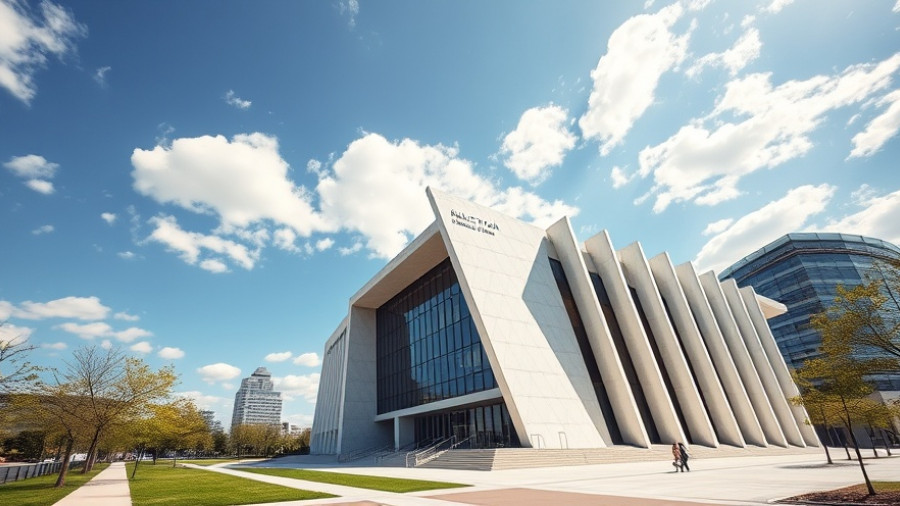
Understanding the Costly Dilemma of Dallas City Hall
The Dallas City Hall, an architectural gem designed by renowned architect I.M. Pei, is at a crossroads as it confronts significant structural issues and escalating maintenance costs. With estimates ranging as high as $345 million, city officials must weigh whether to invest in repairs or consider selling this iconic building. The decision is made even more pressing by the potential interest from the Dallas Mavericks, who contemplate a significant move that could reshape the future landscape of downtown Dallas.
Rising Costs and Deferred Maintenance
Officials initially projected that around $80 million would be required to address deferred maintenance issues at City Hall. However, recent updates indicate that the price tag could soar beyond $152 million, with crucial repairs related to water damage and structural integrity taking precedence. As Councilman Chad West highlights, aging systems like HVAC and plumbing further complicate the financial implications of maintaining the building. Residents are left wondering whether these costs align with the city's top priorities, especially since community leaders stress the need for addressing pressing concerns like infrastructure and public services.
The Debate: Renovation vs. Relocation
The City Council is now grappling with the question: Should we invest in renovating our historic City Hall or consider moving government operations entirely? Council members such as Maxie Johnson and Paul Ridley emphasize the need for comprehensive assessments of both costs and community impact. On one hand, there are voices supporting the preservation of this iconic structure, as community members express sentimental attachment to its unique design and historical significance. However, the financial realities are imposing, and some council members argue that funds might be better spent elsewhere.
A History of Distinguished Service Amidst Challenges
Since its inception in 1978, Dallas City Hall has served as a symbol of municipal governance and civic pride. Yet, the building's maintenance has long been neglected, contributing to a deterioration that now poses serious risks. Community activist Claudia Fowler passionately advocates for preserving City Hall, reflecting on her experiences attending council meetings and city events there. Meanwhile, others echo Councilman West's concerns about whether the city can justify further investment in a building that has shown signs of significant wear and tear.
The Role of Community Sentiment and Future Spaces
With talks of possibly relocating city operations, the public's sentiments about architectural heritage and civic responsibility come to the forefront. The potential move of the Dallas Mavericks, who are exploring options for a new stadium ideally suited for the 2031 deadline, further complicates the narrative. The dynamic between sports, culture, and public infrastructure inevitably raises questions about priorities and the identity of Dallas as a thriving economic engine.
Exploring Perspectives: What Do Residents Think?
Residents are divided on the future of City Hall. Some strongly feel that it embodies a unique architectural identity, while others express the need for practical governance to address important community issues. This debate reflects broader conversations happening in cities across the country about how to balance historical preservation with modern needs. As the city deliberates options, community voices will play a critical role in shaping its future.
Next Steps: What Lies Ahead?
The Dallas City Council has instructed the Finance Committee to evaluate all potential options regarding City Hall’s fate. As discussions unfold, they promise to be heated and thoughtful. The outcome holds the potential to redefine Dallas's urban environment and its civic identity. Councilman Zarin Gracey asserts that decisions will ultimately refine themselves according to the numerical, financial realities at stake.
As stakeholders engage in these pivotal discussions around the future of Dallas City Hall, the community is encouraged to stay informed and participate in upcoming council meetings. Whether advocating for preservation or modernization, understanding the implications of this conversation is critical for every resident.
In conclusion, the future of City Hall is emblematic of larger questions about the evolving role of public spaces in the city’s growth story. Dallas must navigate the fluid interplay of history, economics, and community sentiment to ensure that its decisions foster both heritage and innovation. Stay connected with developments through the Dallas Chamber of Commerce to understand how these decisions will affect Dallas’s business climate and economic vitality.
 Add Element
Add Element  Add Row
Add Row 



Write A Comment